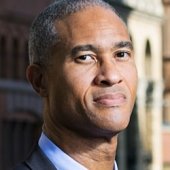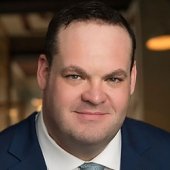Former Schwab CEO Evelyn Dilsaver talks AI, crypto and future of financial services
IN BRIEF
- "The rise of technology allowed you to optimize your portfolio and do risk optimization better than you ever did before, because now you had all this data at your fingertips. That’s what’s changed."
- "Interesting thing is that many of the banks now are moving towards digital assets, which again, is to make life more easy and efficient for the consumer. In May of 2020, there were only 35 central banks using digital currencies. Today, there’s 114."
- "Over the next several years, whether it’s crypto or some sort of digital asset, we’re going to have to figure out how to accept it. And it also means what do we do for our employees in terms of using AI."
Evelyn Dilsaver, financial executive and former Charles Schwab President and CEO, discusses the future of money with Joe Kornik, Editor-in-Chief of VISION by Protiviti. In this interview, Dilsaver reflects on financial services of the past and looks ahead at a less predictable future with AI and crypto, and what their impact could mean for financial services and investment management over the next decade and beyond.
In this interview:
1:10 - The evolution of financial services
4:36 - Disruptors in the investment space
6:42 - The future of crypto
8:47 - The next decade of financial services
10:35 - Bold predictions: Crypto, data and AI
Former Schwab CEO Evelyn Dilsaver talks AI, crypto and future of financial services
Joe Kornik: Welcome to the VISION by Protiviti Interview. I’m Joe Kornik, Editor-in-Chief of VISION by Protiviti, a global content resource examining big themes that will impact the C-suite and executive boardrooms worldwide. Today, we’re exploring the future of money, and I couldn’t be more excited to welcome in financial executive Evelyn Dilsaver. Evelyn is the former president and CEO of Charles Schwab Investment Management, where she led all facets of the business, growing its assets from 137 billion US$ to more than 200 billion in just four years, all while generating more than a billion dollars in revenue. Prior, she served as the chief financial officer and chief administrative officer for U.S. Trust. She currently sits on several public and private boards, including Protiviti’s advisory board. Evelyn, thank you so much for joining me today.
Evelyn Dilsaver: Joe, thank you so much for having me.
Joe Kornik: Evelyn, I mentioned in your introduction that you spent more than 16 years as an executive VP at Charles Schwab. Talk to me a little bit, if you will, about the evolution of the industry over that time, and even what’s happened in the space in the 15 years since. It strikes me that it’s a radically different industry today than it was way back in the 1990’s when you joined.
Evelyn Dilsaver: Right. It has changed so much. If you think about the evolution of the industry when I joined Schwab in 1991, I could break it into two parts. The first part is around the brokerage side of the business, and the second part is around the investment management. On the brokerage side of the business, I would term it with the rise of the individual investor, that can do their own trades instead of having to go through a broker, and it was also at rise of choice and one platform.
If you remember back then when you wanted to buy a mutual fund, for example, you would have to go to the mutual fund company, whether it was Vanguard or Fidelity or any of those mutual funds. So, you ended up having to deal with many statements at the end of the month. And then Schwab invented OneSource, which allowed all of those mutual fund companies to be on one platform so you, as a customer, were able to buy multiple different company funds and get one statement at the end of the month. That was an evolution for the industry. Having said that, from the mutual fund side, you lost the sight of the customer, because Schwab owned the customer, not you, and that made for a different kind of marketing.
The other thing that really rose up during that time in the mid-90s was online trades. All of a sudden, your computer could do your trades for you, and for a while, we started separating out trades in the branch versus trades online and pricing it differently. But we found our customers were arbitraging us and trying to do both at the same time. And that leads me to investment management and how much it has changed. Again, I mentioned before, the customer used to be owned by the mutual fund company, and now this platform where you get to sell all of your funds, that platform owned the customer, so you had to sell differently. At the same time, we were moving away from active investing into passive investing, and the rise of the index funds were showing up a lot.
And then as I mentioned sales. You used to be able to go sell to the branches and to the brokers, and now, because of the construct of portfolios for individuals, you now had to sell to a centralized team that dictated to the brokers and the portfolio managers what kind of investments to invest in. So, it changed the whole sales process.
And then for portfolio management, again, the rise of technology allowed you to optimize your portfolio and do risk optimization better than you ever did before, because now you had all this data at your fingertips. That’s what’s changed.
Joe Kornik: Right. And I would imagine that technology piece is what’s going to—really, what’s supercharging the evolution of the industry now. So, when you look out over the investment management landscape right now, what disruptors do you see in this space, and how should investment managers navigate them? What would be your advice?
Evelyn Dilsaver: Well, I would agree with your last comment, Joe. Technology is going to still be a huge factor. There’s the robo-advisors. So, now, you use technology to be able to give advice, and you don’t need an individual there. And of course, that really depends on the size of the portfolio and the trust of the customer. There’s also auto investment advice, and there’s even more advanced data analytics to be able to do your investment research.
I was talking to a friend of mine who is in the investment management business, and because of the data analytics, he indicated that some portfolio managers are actually moving to very concentrated portfolios versus the very diversified portfolios because they can, because of data analytics and the ability to research and dive deeper into the stocks that they choose.
Alternative investments will continue to rise. Over the last 15 years, at least when I was still at Schwab, and of course, it’s gone on, the rise of exchange-traded funds where it’s very tax advantaged vehicles, but I’m even seeing exchange-traded funds for crypto. Imagine that. So, they’re taking digital assets, if you will, and creating ETFs out of them.
We’ll continue to see regulatory reform. That’s still big because of the focus on enhanced transparency and improving risk management. Big focus on ESG. Of course, there’s some debate about whether it really does perform better than those without the ESG metrics. And then, more global. Emerging markets is continuing to make a big dent in where people spend their time.
Joe Kornik: Yes, interesting. Thanks, Evelyn. You mentioned the word crypto, which is on the tip of everyone’s tongue, it seems, when we talk about the future of this space. So, I’d be curious to hear your thoughts on crypto and its future.
Evelyn Dilsaver: Well, thanks, Joe. Crypto is fascinating to me. Have I invested in it? No, not yet, but having said that, if you think about crypto or even Bitcoin when they first started, the reason they started was to try to make transactions easier, faster, and decentralize the power that banks had to charge fees. So, for example, if you wanted to wire funds to your friend in Europe, you had to pay a pretty hefty fee, and it would take several days to do that. The belief of Bitcoin and crypto is that fees would be less because it's digital. You don't have to worry about the time. You can actually see your transaction in your account within seconds and minutes, and it was a very decentralized approach.
Having said that, some of the big issues—so for example, if you’re using Bitcoin—Bitcoin uses huge computer systems to verify the transactions, but they’re expensive. So, you build more and more systems, and eventually, it becomes centralized, and it has to be governed just like banks do.
Interesting thing is that many of the banks now are moving towards digital assets, which again, is to make life more easy and efficient for the consumer. In May of 2020, there were only 35 central banks using digital currencies. Today, there’s 114. So, the banks are really moving into this, pretty big time, again, to make life easier for them and more efficient, because think about it, you don’t have to print anything. If you do a transaction, for example, in a brokerage, it takes two days to settle your trade. Now, it can take minutes to settle your trade instead of two days.
So, to me, it’s fascinating, but I think where you’re going to invest are the underlying platforms that make it happen versus the very edge of the crypto.
Joe Kornik: If you could take me out, let’s say, even to 2030, and look almost a decade into the future, what do you see? I mean, there’s lots of challenges or lots of opportunities. What do you think the next decade holds?
Evelyn Dilsaver: Joe, I think the next decade will still be one of “Can I trust you?” and security and privacy. Think about what we just mentioned on digital assets. I mean, you’re okay if you go to the store and buy something with your Visa card. For example, in China, everything is tied back to the government so that they can see your information, and in the U.S., I know we’re not really good about letting the government have our information. So, I think privacy and the regulation of that will continue to be big for us going forward.
Trust is going to be another big one. If you can get back into where people will trust you as a company and you as an individual, because we’ve lost a lot of that today. And if I look at the macro environment, I think employment is going to be tough. There’s declining population. I see it in the schools and the universities where schools are shutting down because there aren’t enough students to come through, and that trickles all the way up through college, and of course, employment.
So, there will be, over the next several years, a fight for talent, especially as the baby boomers retire and the younger ones come up, and the declining birth rate would lead up to that. Then, I think, again, digital assets will take off. Once they start to become favored by everybody and accepted by everybody, it’s going to be a huge change for our country moving forward.
Joe Kornik: Right. And specifically, in the investment management space or in the financial industry, any bold predictions for 2030 and beyond?
Evelyn Dilsaver: We’re all going to have to learn how to accept crypto. So, even my companies today, I’ll ask them, “What is our policy about accepting crypto if somebody wants to buy something?” Or “Have we even been asked for that?” and the answer today is no. Now, it depends on which industry you’re in, but the answer today for my companies is, “Oh, no. No, we’re not taking crypto. We’re not accepting it.” But over the next several years, whether it’s crypto or some sort of digital asset, we’re going to have to figure out how to accept it. And it also means what do we do for our employees in terms of using AI.
We didn't talk about that, but AI and chat. Can our employees use them, and what regulations or guidelines do we have around that that we want to employ, because you don’t know where that data is coming from, right? So, again, in the future, I think data analytics is going to be big because you’re going to have to be able to discern truth from fiction, and companies are going to have to be able to use that data in a way that makes sense for them moving forward.
Joe Kornik: Evelyn, I have to ask this question. Could AI replace financial advisors some day?
Evelyn Dilsaver: That’s a great question, because when I was going to do this with you, I went on to ChatGPT and I asked about what is the future for investment management, and actually came back with a lot of the same answers that I have just given you, but I also asked for investment advice. Now, I won’t tell you what the investment advice was, but it was really credible. So, yes, I think that can happen. To a certain degree, we’re already doing it, right? The robo-advisors that many of the firms are using, those are all built off of data analytics that give you the optimized portfolio for where you are in your life, and when you want to retire and all of that, and what your assets are. So, I think it’s already happening.
Joe Kornik: We all have to up our game, it sounds like.
Evelyn Dilsaver: It does.
Joe Kornik: Well, thank you so much, Evelyn. I appreciate you joining us today.
Evelyn Dilsaver: Thank you, Joe. This was fun.
Joe Kornik: And thank you for watching the VISION by Protiviti interview. On behalf of Evelyn Dilsaver, I’m Joe Kornik. We’ll see you next time.
Did you enjoy this content? For more like this, subscribe to the VISION by Protiviti newsletter.




























